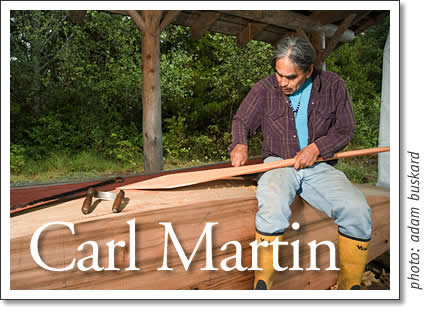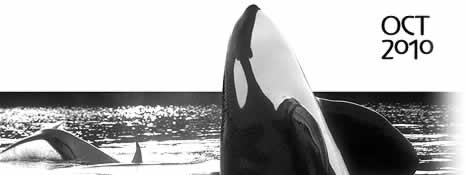
Tofino artist Carl Martin creates the trophy for the Cold Water Classic.
![]() Carl Martin has been carving since the 1960’s, and along with his brothers Joe Martin and the late Billy Martin, is responsible for keeping the art of canoe making alive on the west coast. Carl makes his living by guiding and carving, and has worked on countless projects that have included house poles, totem poles, traditional fishing tools, canoes and paddles.
Carl Martin has been carving since the 1960’s, and along with his brothers Joe Martin and the late Billy Martin, is responsible for keeping the art of canoe making alive on the west coast. Carl makes his living by guiding and carving, and has worked on countless projects that have included house poles, totem poles, traditional fishing tools, canoes and paddles.
Carl carries the name Hiiskuuthsinapshiilthl, He Comes From War, for his hereditary chief and oldest brother Robert Martin, or Nuukmiis. Carl spent all his time carving, hunting, and fishing with his father, Robert Martin Sr., when he was alive, and now no one living knows more about the place names of Clayoquot Sound than him. He worked on a project with the Ahousaht and Hesquiaht that resulted in over 3000 place names being recorded.
During the Meares Island court case Carl worked closely with archaeologists and anthropologists to provide evidence that showed his people have lived on the island since time immemorial. He has climbed every peak in the sound except for Tl’aakishtke’iish, Standing Out On Its Own, but that is on his list. He has been a part of six documentaries, including The First Scientists, Heartland My People, and Saltwater People. He is a skilled hunter, gatherer, fisherman, guide, expert on traditional food and medicine preparation, and is very generous with his knowledge, skills and time. Hiishkaa can always be found out on his ha’huulthlii, land and sea, using it.
by Cam Baker, Norma Dryden, and Carl Martin. Cam is a musician and filmmaker, and recently volunteered to document the Carving On The Edge Festival that Norma spearheaded and Carl was featured in, demonstrating canoe carving.
When Carl was first asked to carve a paddle as a trophy for the O’Neill Cold Water Classic he didn’t realize the significance of the event. He had never really paid much attention to surfing, actually he had never even watched anyone surf before the competition.
For Carl the paddle is full of memories and significance. He was first taught to carve paddles by his uncle Walter Williams. The paddle was an important tool in the Nuu-chah-nulth culture. It was a necessity of life as it provided travel, food and protection. Carl prefers to carve his paddles in yew wood. It is a strong and resilient wood that gives the paddle a powerful flex. The yew tree is revered in the Nuu-chah-nulth culture. You weren’t allowed to just go and cut one down. You had to have a good reason, and show it respect and thanks. They grow slow and twisted so to find one that is big enough and straight enough to get a paddle out of is rare.
Carl is honoured to once again carve the trophy for this year’s Cold Water Classic. He was happy that it stayed in the community last year when Pete Devries won it and is excited to see where it goes this year.
by Adam Buskard
First Nations Culture
- Tofino artist Carl Martin carves CWC trophy
- Canoe Carver Joe Martin Dec. 2002
- Nuu-Chah-Nulth Canoe Carving Sep. 2002
- Saa-Sis-Qua-Iis, the Canoe Mar. 2003
- The West was Never Won Aug. 2002
- Gisele Martin in Tofino April. 2004
Tofino Time October 2010
- Tofino in October 2010
- Queen of the Peak: Tofino hosts all-women surf comp
- O'Neill CWC 2010: Re-Pete Devries?
- Tofino artist Carl Martin carves CWC trophy
- Wickaninnish Beach
- Ucluelet Aquarium release day: October 16, 2010
- Tofino tides: Tide table for Tofino October
- Events in Tofino: Entertainment in October
- October concerts in Tofino
- Movies in Tofino: October 2010
- Tofino Film Festival: October 28-31, 2010
- Tofino yoga classes in October 2010
- Horoscope for October 2010
- Tofino surf reports for October 2010
- Community Directory: Goods & Services in Tofino
tofino | tofino time | activities | accommodation | events | directory
maps | travel | food | art & artists | photos | horoscope | tides
search | magazine | issues | articles | advertising | contact us
hosted in tofino by tofino.net & studio tofino
© 2002-2014 copyright Tofino Time Magazine in Tofino Canada
Tofino artist Carl Martin carves a traditional yew wood canoe paddle as the trophy for this years’ O'Neill Cold Water Classic Canada surf competion in Tofino.

quick links:
- tofino accomodations
- tofino calendar
- tofino surf report
- tofino horoscope
- march horoscope
- tofino map
- tofino fishing report
- tofino tides
- tofino weddings
tofino events:
- tofino concerts
- tofino events
- tofino movies
- tofino festivals
- tofino yoga classes
- tofino whale festival
tofino time magazine:
- tofino time march 2016
- tofino event listings march 2016
- tofino concerts in march 2016
- tofino movies in march 2016
- cox bay | wickaninnish beach
- chesterman beach
- tonquin beach
- tofino brewing co.
- tofino wedding guide
tofino accommodation:
- tofino cabin
- tofino camping
- bed & breakfasts in Tofino
- tofino hostels
- tofino motels
- tofino hotels
- tofino vacation rentals
- petfriendly accommodation
activities:
- tofino bike rentals
- tofino bear watching
- tofino bird watching
- tofino boat charters & cruises
- tofino fishing
- hot springs cove
- sea kayaking in tofino
- tofino storm watching
- tofino surfing
- tofino whale watching
- tofino yoga
shopping:
services:
- tofino yoga, spa & wellness
- tofino restaurants
- tofino internet cafes
- tofino travel & transportation
- tofino real estate
- tofino taxi services
- tofino wedding & events
